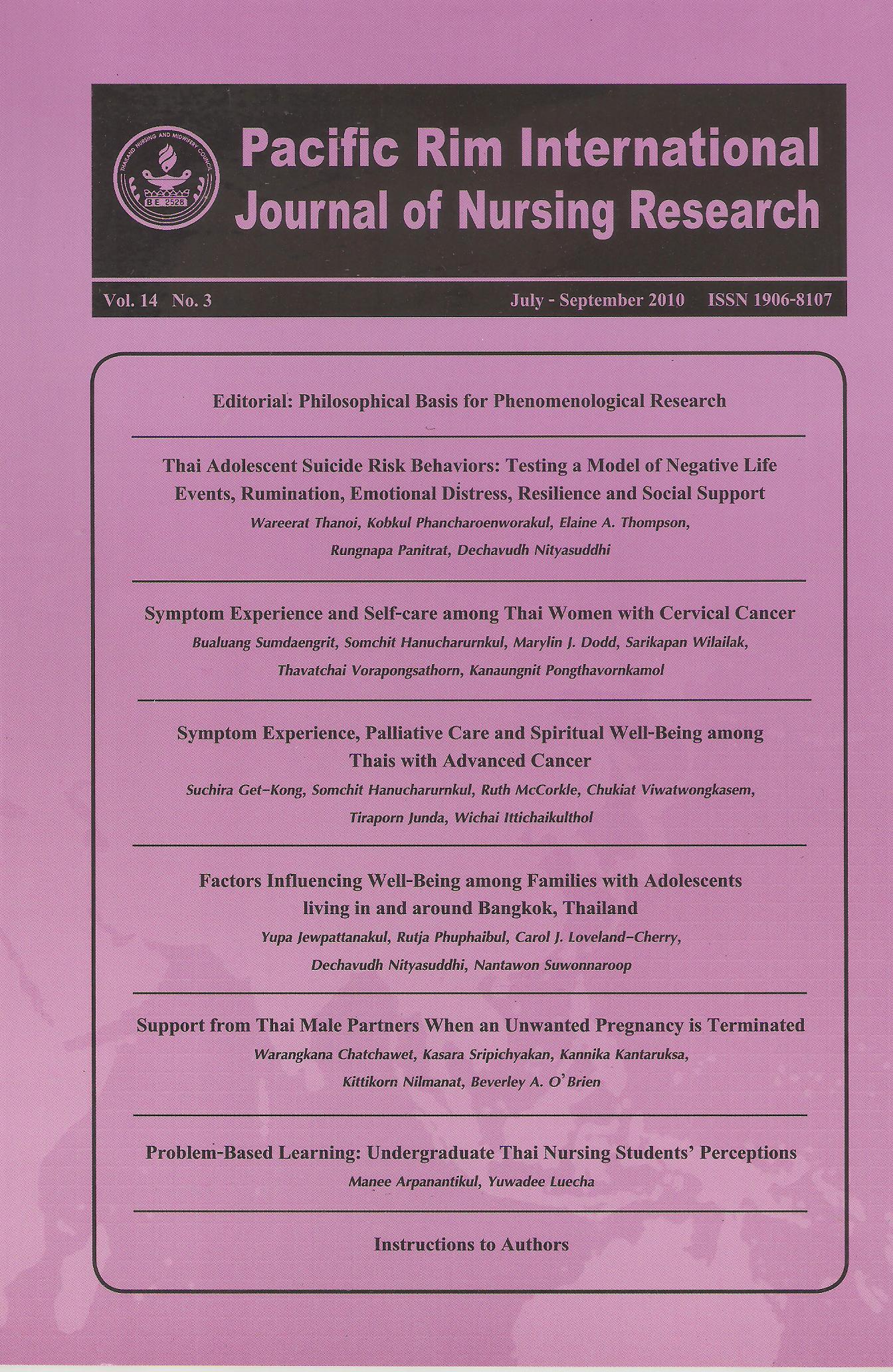Thai Adolescent Suicide Risk Behaviors: Testing a Model of Negative Life Events, Rumination, Emotional Distress, Resilience and Social Support
Keywords:
พฤติกรรมเสี่ยงในการฆ่าตัวตายของวัยรุ่น, ความครุ่นคิด, ความตึงเครียดทางอารมณ์, ความเข้มแข็งในชีวิต, การสนับสนุนทางสังคม, Adolescent suicide risk behaviors, Rumination, Emotional distress, Resilience, Social supportAbstract
บทคัดย่อ
วัตถุประสงค์การศึกษาวิจัยในครั้งนี้เพื่อศึกษาโมเดลการทำนายซึ่งแสดงถึงความสัมพันธ์ร่วมกันของเหตุการณ์ในชีวิตเชิงลบ ความครุ่นคิด ความเข้มแข็งในชีวิตและการสนับสนุนทางสังคมต่อความตึงเครียดทางอารมณ์ และ อิทธิพลส่งผ่านของความตึงเครียดทางอารมณ์ต่อพฤติกรรมเสี่ยงในการฆ่าตัวตายในวัยรุ่นไทย กรอบแนวคิดของ Cognitive Theory of Depression และ Response StyleTheory of Depression ได้ถูกนำมาใช้เป็นกรอบแนวคิดของการวิจัย กลุ่มตัวอย่างได้จากการสุ่มแบบหลายขั้นตอนจากวัยรุ่นที่กำลังศึกษาในโรงเรียนมัธยม 12 แห่งในกรุงเทพมหานคร จำนวน 1,417 คนการเก็บรวบรวมข้อมูลได้จากการใช้ชุดแบบสอบถามการประเมินตนเองซึ่งประกอบด้วยแบบวัดความคิด ความรู้สึกและประสบการณ์ของวัยรุ่น แบบวัดการตอบสนองทางความคิดต่อสถานการณ์แบบวัดความช่วยเหลือทางสังคมแบบพหุมิติ แบบวัดความเข้มแข็งในชีวิต และแบบวัดเหตุการณ์ที่สร้างความยุ่งยากใจ
ผลการศึกษาพบว่าโมเดลเชิงโครงสร้างมีความสอดคล้องกับข้อมูลเชิงประจักษ์ (X2= 225.48, df=194, p=0.0602, GFI=0.982, AGFI=0.967, RMSEA=0.013) โดยสามารถอธิบายความแปรปรวนของพฤติกรรมเสี่ยงในการฆ่าตัวตายของวัยรุ่นไทยได้ถึงร้อยละ 41.9 โดยพบว่า เหตุการณ์ในชีวิตเชิงลบ และความครุ่นคิด มีอิทธิพลต่อพฤติกรรมเสี่ยงในการฆ่าตัวตายของวัยรุ่นโดยส่งผ่านตัวแปรความตึงเครียดทางอารมณ์ ที่สำคัญคือความเข้มแข็งในชีวิต และการสนับสนุนทางสังคมสามารถช่วยลดอิทธิพลของตัวแปรทุกตัวแปรเนื่องจากความเข้มแข็งในชีวิต และการสนับสนุนทางสังคมทำหน้าที่เป็นตัวแปรส่งผ่านที่ช่วยลดการเกิดความตึงเครียดทางอารมณ์อันจะส่งผลให้พฤติกรรมเสี่ยงในการฆ่าตัวตายของวัยรุ่นลดลงเช่นกัน ผลที่ได้จากการศึกษานี้สามารถนำไปสู่วิธีการปฏิบัติการพยาบาลในการป้องกันการเกิดพฤติกรรมเสี่ยงในการฆ่าตัวตายของวัยรุ่นรวมทั้งส่งเสริมให้วัยรุ่นกลุ่มนี้มีสภาวะสุขภาพจิตที่ดีต่อไป
คำสำคัญ: พฤติกรรมเสี่ยงในการฆ่าตัวตายของวัยรุ่น; ความครุ่นคิด; ความตึงเครียดทางอารมณ์; ความเข้มแข็งในชีวิต; การสนับสนุนทางสังคม
Abstract
This study investigated, by way of a predictive model, the simultaneousinfluence of perceived negative life events, rumination, resilience and social supporton emotional distress, and the mediating effects of emotional distress on suicide riskbehaviors among Thai adolescents. Cognitive Theory and Response Style Theory ofDepression served as the conceptual framework. A multi-stage, random samplingtechnique was used to select 1,417 adolescents attending 12 high schools inBangkok, Thailand. Data were collected by a set of self-report questionnairesincluding the: Personal Profile; Thoughts, Feelings and Experiences Questionnaire;Rumination Response Scale; State-Trait Resilience Inventory; Multidimensional Scaleof Perceived Social Support; and, Negative Events Scale.
The results of LISREL structural equation modeling revealed the model fit thedata well (Chi-Square = 225.48; df = 194; p = 0.0602; GFI = 0.982; AGFI = 0.967;RMSEA = 0.013). The variance accounted for 41.9 % of the adolescents’ suicide riskbehaviors. This model showed that negative life events and rumination had significantindirect effects on suicide risk behaviors through emotional distress. Importantly,resilience and social support could reduce the influencing effects of all variables,because they mediated the effects of rumination and negative life events onemotional distress, which could lead to a decrease in suicide risk behaviors. Thefindings illustrate the knowledge and understanding of means that could bemanipulated by nursing interventions, in order to decrease suicide risk behaviors amongadolescents, as well as promote optimal mental health in this vulnerable population.
Keywords: Adolescent suicide risk behaviors; Rumination; Emotional distress; Resilience; Social support
Downloads
How to Cite
Issue
Section
License
Copyright: The Pacific Rim International Journal of Nursing Research, Thailand Nursing & Midwifery Council has exclusive rights to publish, reproduce and distribute the manuscript and all contents therein.







.png)


